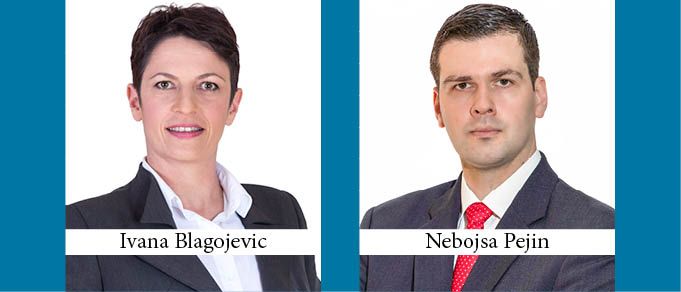When it first appeared, the compliance field seemed little more than “regulatory” in new clothes – a fancy name for making sure a company stayed within the ambit of provisions set out in the laws of a country. As time passed, however, more and more companies started treating compliance as a practice in its own right, and as a field of law … that is much more than just law. Compliance became an area of interest not only to seasoned lawyers, but also to scholars, consultants, and in-house counsels – all levels of legal practice became aware of its significance.
The New Law on Healthcare Protection
At the beginning of April 2019, the Serbian Parliament adopted the new Law on Healthcare Protection (the “Law”), with the aim of improving the legal framework and facilitate better functioning of the healthcare system in Serbia, aligning it more closely to EU standards in this field.
The Corner Office: Performance Reviews
In The Corner Office we ask Managing Partners across CEE about their unique roles and responsibilities. The question this time around: How do you do performance reviews, and how important are they to the planning and management of the firm?”
Compliance Out of the Shadows
Adriana Minovic is the Head of Data Protection and DPO of the Ergomed Group, a provider of clinical research, pharmaco-vigilance, and other services in the Life Sciences industry, with headquarters in Guilford, U.K. Prior to joining Ergomed, Adriana was Head of Conent Security and DPO for the United Group, and before that as a lawyer specializing in regulatory/compliance matters at Air Serbia. Earlier still, she was an adviser for the European Integration Office of the Government of the Republic of Serbia and a legal adviser in Serbia’s Ministry of Trade, Tourism and Telecommunications.
Support Scheme for Renewables in Serbia: A New Chapter
At the end of 2018, the Government of the Republic of Serbia extended the validity of the Decree on Incentive Measures for the Production of Electric Energy from Renewable Energy Sources and High-efficiency Cogeneration of Electric Energy and Thermal Energy (the “FIT Decree”) until the end of 2019. The FIT Decree was initially valid until the end of 2018.
Guest Editorial: Digitalize
Although I am a bit old to claim that my generation has two birthdays – a natural one and an Internet one – I believe, for that same reason, that we have the experience to assess progress in respect of ongoing digitalization trends.
The Corner Office: Commonly-Lacking Skills
In The Corner Office we ask Senior and Managing Partners across Central and Eastern Europe about their unique roles and responsibilities. The question this time around: “What is the one skill, ability, or characteristic that fresh law school graduates in your country most commonly lack?”
Looking Back on Five Years of Dramatic Change In Serbia
In the last five years significant changes have occurred in the Serbian business and political environment. This has been a time of dramatic change – with the general goal of transforming the position and the image of Serbia both regionally and globally, strongly affirming a pro-EU stance and making Serbia much more attractive for foreign investment. Obviously, both of these goals are interconnected because improving the image of a country brings more investments, and foreign investors generating profits in Serbia improves Serbia’s global image.
The Serbian Legal Market: The Past Five Years
The Serbian legal market has changed rapidly over the past five years. After less than 30 years of existence in this form, our legal market is still relatively young and its pioneers emerged in the early 1990s. Nevertheless, it is also a dynamic market and brings change every year, especially due to the European Union accession negotiations and additional harmonization of the country’s legislation with EU legislation. On the other hand, frequent changes in law have become a general rule, providing more work for law firms, but also bringing a high level of uncertainty for their clients.
A Transformation in the Balkan Legal Industry
A transformation of the legal profession is happening globally, and its effects are also felt, slowly but surely, in the law firms of Southeast Europe. Due to the changing expectations concerning the quality, speed, and commerciality of services, we are seeing a move towards even more client-oriented solutions. Traditional sectors are being replaced with emerging industries, and where we previously had slow processes, with low profit margins, we see value being generated at lightning speeds. Also, a new generation that entered the workforce recently is slowly imposing their own values and approaches, necessitating changes in structure and the values of traditional legal practices.
The Winter Metamorphosis of Serbia’s Tax System
The beginning of 2019 will mark the start of a major transformation of the Serbian tax system, bringing new and exciting opportunities for companies who do business or wish to invest in Serbia, but also bringing potential challenges concerning the practical application of new tax rules.
The Evolution of NPLs in Serbia
The NPL market in Serbia traditionally knows of only two concerns, embodied in the numbers 48 and 204. Although you would assume that numerology had something to do with this assertion, the backstory is actually a lot more appealing.
Designing a Competition Enforcement System: The Imperative of Credibility
It is not uncommon for post-communist societies to wrestle with the idea of competition enforcement. Executives of a more old-school bent are often confounded by having something which once was common market practice, sometimes even mandated by the state, now scrutinized and considered a serious infringement of law. This is why competition advocacy is a crucial tool for relatively inexperienced competition authorities – it would hardly be fair to beat upon market players legitimately unaware of changes to the modus operandi.
Inside Insight: Interview with Miljan Malovic of Banca Intesa
Miljan Malovic is the Head of the Business Legal Advisory Office of Banca Intesa Belgrade. He graduated from the Faculty of Law at the University of Belgrade in 2001, and joined Banca Intesa in 2006.
Amendments to the Planning and Construction Act – No Break in Reforms
The Serbian Ministry of Construction, Transportation and Infrastructure has initiated the process of amending the country’s Planning and Construction Act, with the aim of boosting the construction industry and making the legal environment in the sector more predictable, reliable, and investor-friendly. The Serbian construction law has been revolutionized the last few years, with the introduction of e-permits and the unclogging of many sclerotic procedural labyrinths, so the readiness of the Serbian government to continue with the reforms and modernization is generating new excitement in the construction sector.
Guest Editorial: A Change in the Legal Narrative – Past Fears and New Opportunities
Until a few years ago, the narrative within legal practices, as in most service industries, focused mainly on austerity, small growth numbers, and the crises. Most legal practitioners feared an uncertain future and all the risks it held, including evolving client expectations, financial pressure, and the long-term impact of the global economic crisis.
Trade Secrets in Serbia
As Serbia is gearing up for EU accession, harmonizing with EU legislation and business practices becomes not only mandatory, but also a market necessity. Although there are discrepancies between business practices in Serbia and in the EU, one thing seems to be unanimous: local businesses, just like their international counterparts, think ahead when it comes to securing their assets. This applies to every type of business, but it is prevailingly visible in local medium-sized to large businesses which predominantly handle and/or deal with IP portfolios. Nowadays, in the ever-evolving digital world, where almost information is at the reach of one’s hand – even to those located in remote corners of the world – attention and focus are being switched to ensuring the adequate protection of trade secrets. This process is happening in Serbia as well.
Now or Never: The Looming GDPR Deadline
The European Union’s General Data Protection Regulation is, according to the EU-hosted GDPR website, “the most important change in data privacy regulation in the past 20 years.” The Act, which was approved by the EU Parliament on April 14, 2016 and will become fully effective on May 25, 2018, was designed “to harmonize data privacy laws across Europe, to protect and empower all EU citizens’ data privacy, and to reshape the way organizations across the region approach data privacy.”










































